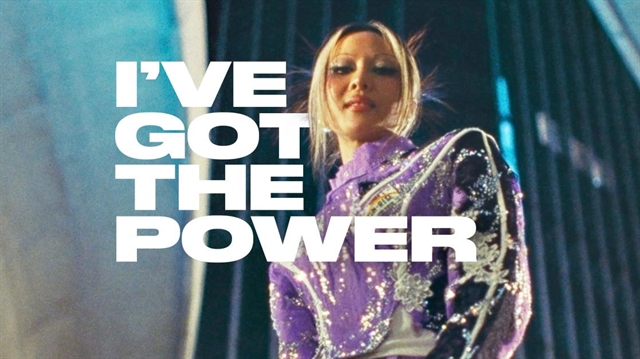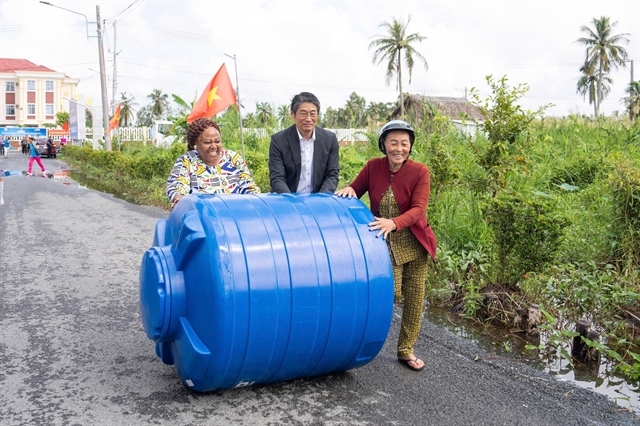 Opinion
Opinion

 |
| ITO Naoki and Caroline Nyamayemombe visit a disadvantaged woman’s household benefiting from a water-saving irrigation system provided by the “Water is Life” project, November 2024. — Photo courtesy of the UN Women |
By Caroline Nyamayemombe and ITO Naoki
As one of the most climate-vulnerable countries in the world, Việt Nam is facing an escalating climate crisis. Rising sea levels and increasingly severe disasters threaten not only its stunning landscapes but also the lives and livelihoods of millions of its people, from urban centers to mountainous regions and coastal areas.
The Mekong Delta, a vital agricultural hub, exemplifies this vulnerability, grappling with drought, rising sea levels, and saltwater intrusion. Typhoon Yagi was yet another harsh reminder of Việt Nam’s growing battle against climate-related disasters. According to the Việt Nam Multi-Sector Assessment Report, the disaster caused extensive damage in 26 provinces, resulting in 320 deaths. The agricultural sector, which sustains many rural communities, was hit particularly hard, exacerbating economic hardships.
Amidst these challenges, women are disproportionately affected. On a visit to Cà Mau in November 2024, Nguyễn Thúy Huỳnh, a 39-year-old farmer from Khánh Bình Tây Commune, said, “I have to collect water to irrigate crops by hand. These tasks are time-consuming and exhausting, especially in the dry season.” In many rural households, access to clean water is a daily struggle, with women bearing the burden of managing limited supplies. Additionally, restricted access to financial resources, technology, and land ownership makes it harder for them to sustain agricultural livelihoods.
The reality in Cà Mau is mirrored in rural areas throughout Việt Nam.
Women play a crucial role in agriculture, a sector highly vulnerable to climate change. According to the Việt Nam Household Living Standards Survey, 63 per cent of rural women are engaged in farming, compared to 58 per cent of men. Among ethnic minorities, where 81 per cent of the population works in agriculture, women form a significant portion of the workforce. Yet, they often lack the resources to recover from climate-related shocks such as floods, droughts, and water scarcity, which threaten their livelihoods. Strengthening women’s agricultural resilience through training, credit access, and sustainable farming techniques is essential for food security and economic stability.
Việt Nam has strong policies supporting women farmers, but these require better resourcing and ensuring women’s inclusion in decision-making. Key international agreements, including the Beijing Declaration, the COP29 Resolution on Gender and Climate, and the Asia-Pacific Declaration on Gender Equality, emphasise addressing women’s unique challenges and ensuring they have a meaningful voice in climate adaptation efforts.
UN Women in Việt Nam and Embassy of Japan in Việt Nam are working with the government to strengthen women’s resilience to climate change. With funding from the Japan, UN Women implemented the "Livelihood Support Project for Vulnerable Women in Ninh Thuận and Cà Mau Provinces Affected by Drought and Salinity" in 2024, taking an initiative to improve access to clean water for women and their children.
Furthermore, Japan is collaborating with IOM and UNICEF to implement an initiative to provide essential water facilities in the northern mountainous region, including Cao Bằng Provinces, which suffered significant damage from Typhoon Yagi.
UN Women through partnerships with Sweden, and New Zealand, initiatives in Lào Cai, and Đà Nẵng are already delivering results. These efforts empower women by amplifying women’s voices in decision-making, providing climate-smart technologies and training, improving disaster planning through sex-disaggregated data, and integrating gender-based violence prevention. Women’s leadership remains central, with women’s unions driving and implementing key initiatives.
Pi Năng Thị Thiên, a 38-year-old single mother of two in Phước Chiến Commune, from Raglai minority group in Ninh Thuận Province is one of the farmers who has benefited from ‘Water is Life’ project.
The initiative by UN Women and Japan, implemented in Ninh Thuận and Cà Mau, provides water-saving irrigation equipment to help women manage their resources more efficiency.
“I no longer worry about the high risk of losing my fruit garden due to drought. With the water-spraying irrigation system and pump provided by the project, I can now control the watering of my coconuts, jackfruits, banana, corn, and sugarcane”.
This tangible improvement in the livelihoods of vulnerable women farmers like Pi Năng Thị Thiên is a result of the strong leadership of Chamalea Thị Liếm, a dedicated woman leader in her commune.
Born in 1980, appointed chairwoman of the Commune People’s Committee in Ninh Thuận in 2021. She successfully advocated for the 'Water is Life' project, prioritising its swift implementation by providing guidance and clear directions to designated local government staff.
Her leadership ensured timely facilitation and support for water irrigation for women farmers. Additionally, her proficiency in both the local indigenous language of the Raglai minority group and Vietnamese enabled her to lead effectively and communicate the impactful results of the interventions, ultimately improving the lives of women and children in her commune.
Their stories highlight how climate-resilient technologies are transforming the lives of women farmers, easing their workloads and safeguarding their livelihoods against climate change.
As Việt Nam pursues its goals of becoming a high-income country by 2045 and achieving net-zero emissions by 2050, empowering women and girls must remain a priority. True resilience requires more than just climate-smart agriculture technology- it demands that women be fully involved in shaping climate adaption strategies.
The Vietnamese government has announced its National Action Plan on Women, Peace and Security in 2024. Therefore, Việt Nam is at a significant milestone in promoting gender equality and women's empowerment in the field of peace and security. We are confident that the initiative by UN Women and Japan is a welcome development for Việt Nam as well. By investing in women’s agriculture livelihoods and leadership, we invest in a sustainable, climate-resilient future that aligns with Việt Nam’s long-term development ambitions. — VNS
ITO Naoki is the Ambassador of Japan to Việt Nam, and Caroline Nyamayemombe is the UN Women Country Representative









